 | Guantanamera
Playing For Change
Sung Around The World |
|

NEW CCDS Pamphlet
on Climate Change.
|
Blog of the Week...
Viewpoint  Issue 4: Materials for a revolutionary view of the state Issue 4: Materials for a revolutionary view of the state
|

New CCDS Book Reporting on Vietnam
|
|
Radical Jesus:
A Graphic History of Faith  By Paul BuhleHerald Press By Paul BuhleHerald Press
|

Want to Know what CCDS has
been doing...Check it Out!
|
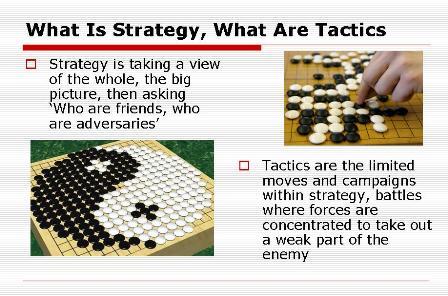 Keep On Keepin' On Keep On Keepin' OnHating the 'Middle Class,' Why Socialists Run in Elections, Strategy and Tactics Slide Slow, Class and Privilege, the Green New Deal ...and other Short Posts on Tumblr by Carl Davidson
|

Edited by Carl Davidson Revolutionary Youth and the New Working Class: The Praxis Papers, the Port Authority Statement, the RYM Documents and other Lost Writings of SDS Changemaker, 273pp, $22.50
For the full contents, click the link and view 'Preview' under the cover graphic.
|
|
By Randy Shannon, CCDS

"Everyone has the right to work, to free of employment, to just and favorable conditions of work and to protection against unemployment."
- United Nations Universal Declaration of Human Rights, December 10, 1948
I. Introduction
The "Great Recession" that began in 2007 has caused the greatest percent of job losses since the Great Depression of 1929. This crisis is the end of an era of unrestrained 'neo-liberal' capitalism that became public policy during the Reagan administration. The crisis marks a new level of instability with the growth of a global financial elite that targeted US workers and our trade unions after World War II.
|
|
Order Our
Full Employment Booklets
 |
 The new annual edition of our journal of discussion and analysis is now out. More than 170 pages, it includes 14 articles on strategy austerity, organizing, and the right. Cost is $10 plus shipping. Or get one by becoming a sustainer. Click the title to buy it directly. The new annual edition of our journal of discussion and analysis is now out. More than 170 pages, it includes 14 articles on strategy austerity, organizing, and the right. Cost is $10 plus shipping. Or get one by becoming a sustainer. Click the title to buy it directly.
|
...In a new and updated 2nd Edition
Capitalism may well collapse under its own excesses, but what would one propose to replace it? Margaret Thatcher's mantra was TINA...There Is No Alternative. David Schweickart's vision of "Economic Democracy" proposes a serious alternative. Even more fundamentally, it opens the door to thinking about alternatives. His may or may not turn out to be the definitive "successor system," but he is a leader in breaking out of the box. |
 by Paul KrehbielAutumn Leaf Press, $25.64
by Paul KrehbielAutumn Leaf Press, $25.64 | | Shades of Justice Video: Bringing Down a President, Ending a War |
|
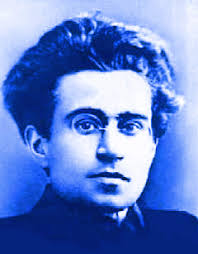 By Giuseppe Fiori
Verso, 30 pages
|

Essays on Mondragon, Marx, Gramsci
and the Green and Solidarity Economies |

The Story of Workers Coops
in the Connecticut River
Valley Today.
Coauthors: Janelle Cornwell
(Worcester State University),
Michael Johnson (Grassroots
Economic Organizing Newsletter)
and Adam Trott (Valley Alliance
of Worker Co-operatives and
Collective Copies)
|

- Foreword by Susan Brownmiller
- Preface by Ken Wachsberger
$37.50 + $6 shipping
|
|
Discussion Documents for a Militant Movement

By Don Hamerquist
|
|
|
|
An Invitation to CCDSers and Friends...
 After 50 Years: After 50 Years:
A Big Win for
Cuba and Us!
We're the Committees of Correspondence for Democracy and Socialism...Do you have friends who should see this? Pass it on...Do you have a blog of your own? Others you love to read every day? Well, this is a place where you can share access to them with the rest of your comrades. Just pick your greatest hits for the week and send them to us at [email protected]!
Most of all, it's urgent that you support low-wage workers, oppose militarized police, the war on Gaza, defend voter rights, plan for 2014 races now, oppose austerity, support the 'Moral Mondays' in North Carolina, the fight for the Green New Deal, a just immigration policy and the Congressional Progressive Caucus' 'Back to Work Budget'! We're doing more than ever, and have big plans. So pay your dues, make a donation and become a sustainer. Do it Now! Check the link at the bottom... |
Why the US-Cuba Deal Really Is a
Victory for the Cuban Revolution

The left should recall and applaud the long resistance of tiny Cuba to the northern Goliath.
By Tom Hayden The Nation
Dec 17, 2014 - No one in the mainstream media will acknowledge it, but the normalization of American relations with Havana, symbolized by release of prisoners today, is a huge success for the Cuban Revolution.
The hostile US policy, euphemistically known as "regime change," has been thwarted. The Cuban Communist Party is confidently in power. The Castros have navigated through all the challenges of the years. In Latin America and the United Nations, Cuba is accepted, and the United States is isolated.
It is quite legitimate for American progressives to criticize various flaws and failures of the Cuban Revolution. But the media and the right are overflowing with such commentary. Only the left can recall, narrate and applaud the long resistance of tiny Cuba to the northern Goliath.
For those actually supportive of participatory democracy in Cuba, as opposed to those who support regime change by secret programs, the way to greater openness on the island lies in a relaxation of the external threat.
Despite the US embargo and relentless US subversion, Cuba remains in the upper tier of the United Nations Human Development Index because of its educational and health care achievements. Cuba even leads the international community in the dispatch of medical workers to fight Ebola. Cuba is celebrated globally because of its military contribution to the defeat of colonialism and apartheid in Angola and southern Africa. Now a new generation of Cuban leaders who fought in Angola is coming to power in the Havana and its diplomatic corps. For example, Rodolfo Reyes Rodr�guez, Cuba's representative to the United Nations, today walks on an artificial limb as a result of his combat in Angola.
When few thought it possible, Cuba has achieved the return of all five prisoners held for spying on right-wing Cubans who trained at Florida bases and flew harassment missions through Cuban air space. The last three to be released served hard time in American prisons, and are being welcomed as triumphant heroes on the streets of Havana. Three of the Cuban Five served in Angola as well.
Tens of thousands of Americans, from the veterans of the cane-cutting Venceremos Brigades to the steady flow of tourists insisting on their right to travel, deserve credit for steady years of educational and solidarity work and for pushing a hardy Congressional bloc towards normalization.
President Obama has kept his word, despite relentless skepticism from both the left and the mainstream media. He is confounding the mainstream assumption that the Cuban Right has a permanent lock on American foreign policy, especially after the Republican sweep in the November elections.
In this case, Obama's extreme emphasis on diplomatic secrecy worked to his advantage. For over a year, leaders in both countries have conducted regular private debates and consultations, which resulted in the detailed normalization plan released in both capitals today. No one was more important on the American congressional team than Senator Patrick Leahy. Their tight discipline held until the final moment.
It is known that the private US-Cuba conversations about Alan Gross and the Cuban Five were the most difficult. The US has never acknowledged that Gross was a de facto spy of a certain type, having traveled five times to Havana to secretly distribute advanced communications technology to persons in Havana's small Jewish community before he was arrested in 2009. Also problematic for American officials immersed in decades of Cold War thinking was the task of wrapping their minds around the idea that the Cuban Five were political prisoners and not terrorist threats.
Finally, when both sides had achieved an internal consensus, the project was derailed by the furious Republican-led blowback against Obama's trade of five Taliban captives for captured American soldier Bowe Bergdahl in May 2014. Then the November elections interfered with, and threatened to indefinitely delay, the normalization announcement further. Chanukah was the last date for an announcement before the installation of the new US Congress.
Because of the anti-Cuban slant of mainstream thinking, the media will make much of the anger of the Cuban Right exemplified by Senator Mario Rubio. But while it's too early to know, it's hard to imagine his presidential ambitions being enhanced by arguing in 2016 that Obama should have tried to overthrow the Castros. Senator Bob Menendez has been a leading Democrat trying to block the Obama initiative from his chairing position on the Senate Foreign Relations Committee. Most Democrats will be delighted to see Menendez, who represents Cuban exiles in Union City, diminished in the Senate.
Going forward, the US will remove Cuba from the "state terrorism" listing, which will ease the possibility of funding from the international financial system. For American citizens, permission to travel to Cuba will be significantly widened. Business and trade possibilities will increase. Starting with the 2015 Summit of the Americas in Panama, the American and Cuban delegations will sit at the same table. The so-called interest sections will be upgraded to formal embassies. The embargo is going to be hollowed out from within, with American tourist and investment dollars permitted to flow. With or without Congressional action to lift the 1996 Helms-Burton act, the embargo is being dissolved. Over 400,000 Cuban-Americans traveled to Cuba last year alone.
And here's a prediction: if the president has his wish, the Obama family will be seen on the streets of Havana before his term is up.
Editor's Note: "Two Old Guys Talking" is the introduction to Tom Hayden's forthcoming book, Listen, Yankee!, Why Cuba Matters, to be published next year by Seven Stories Press. The piece was finalized last month. The "two old guys" are the author, now 75, who first visited Cuba in 1968, and Ricardo Alarcon, now 77, former president of the Cuban National Assembly, foreign minister, and UN representative.
|
|
By People's World Editorial
Dece 18 2014 - Americans and Cubans woke up on Dec. 17 to the jaw-dropping news that the U.S. is making a monumental shift in its relations with Cuba. The remaining three Cuban Five prisoners had been freed from U.S. jails, and two U.S. prisoners, Alan Gross and an unnamed intelligence operative, were returning to the U.S.. Hours later President Obama told the nation: "I've instructed Secretary Kerry to immediately begin discussions with Cuba to reestablish diplomatic relations that have been severed since January of 1961."
The president's actions, negotiated with Cuban President Raul Castro and with the help of Pope Francis, set the stage for an end to the failed 54-year-old U.S. embargo against trade with Cuba, and opened up, as Obama put it, "a new chapter among the nations of the Americas."
This shift was in the making for a while. A recent New York Times editorial series seemed to signal that a major portion of ruling circles were ready to make such a move and for multiple reasons.
The Times pointed out one important reason for thawing U.S. Cold War policy towards Cuba: It would bolster U.S. relations with the rest of Latin America, where the United States finds itself more and more isolated. The solidarity towards Cuba displayed by Venezuela, Brazil, Nicaragua and all the countries of Central and South America and the Caribbean has been unyielding. The United States has found itself isolated throughout the world on its Cuba policy. Last year's United Nations vote on ending the U.S. embargo left the U.S. and Israel as the only two dissenters out of 186 nations.
Public attitudes towards Cuba in our country have been changing dramatically over the years, with majorities now favoring ending the embargo, opening up trade, scientific and cultural ties, and travel and re-establishing full diplomatic relations. Even in the all-important state of Florida, the shift among the politically significant Cuban American population has been seismic. For the first time ever, this previously solid Republican voting bloc chose a Democrat who had called for the end to the embargo over a Republican in the governor's race this year.
But as important as these factors are, making a policy change required a president who had the courage and foresight to act on them. The American people elected such a president in 2008 and 2012. Elections matter.
In addition to the U.S.-Cuba agreement releasing the remaining Cuban Five prisoners and American Alan Gross, and re-establishing diplomatic relations, President Obama announced the following actions:
* making it easier for Americans to travel to Cuba and use credit and debit cards, allowing U.S. financial institutions to open accounts at Cuban financial institutions.;
* significantly increasing the amount of money that Americans can send to relatives in Cuba;
* opening a review aiming toward removing the State Department's designation of Cuba as a state sponsor of terrorism.
* increasing telecommunications connections between the United States and Cuba;
* facilitating more trade.
These remarkable changes are in the interests of the American people. Yet the president pointed out the limitations of executive action.
"These are the steps that I can take as president to change this policy," he said. "The embargo that's been imposed for decades is now codified in legislation. As these changes unfold, I look forward to engaging Congress in an honest and serious debate about lifting the embargo." This is a challenge to us all to build the broadest possible movement to make Congress revoke the 1996 Helms-Burton Act, the 2000 Trade Sanctions Reform and Enforcement Act and four other laws that since 1961 have crippled our policy toward Cuba and therefore our relations with all of Latin America.
This move by Obama is a historic sea-change in U.S. foreign policy. It opens up tremendous possibilities for progressive exchange with the socialist island 90 miles to our south, a country that has been a beacon of hope and progress for the hemisphere and the world. It took enormous courage by this president. The Republican right-wing has already responded with rabid criticism and more can be expected, especially once the new Republican-controlled Congress takes office in January.
Of note is the role played by Pope Francis in facilitating this enormous development. Both Obama and Castro thanked the Pope. This new leader of the billion-strong Catholic Church has stirred the world with his advocacy for the poor, immigrants and the oppressed. All three men - Obama, Castro and Francis - it can be said, are change-makers, taking bold steps - even if they go against some past orthodoxies - to reflect the new realities, complexities and values of the 21st century....(Click title for more)
|
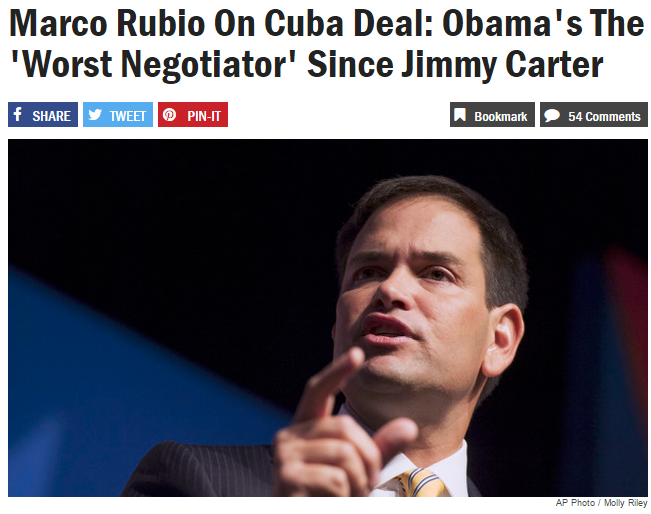
By Michael McAuliff
Huffington Post
Dec. 17, 2014 - WASHINGTON -- President Barack Obama will get no money for his Cuba policy, no ambassador will be confirmed and the embargo will never be lifted, Sen. Marco Rubio (R-Fla.) vowed in a blistering press conference on Wednesday.
In a historic move earlier in the day, Obama announced that the United States will begin talks with Cuba to normalize full diplomatic relations, marking the most significant shift in U.S. policy towards Cuba in 50 years. The president's remarks followed the release on Wednesday morning of American Alan Gross, who had been held in a Cuban prison for five years. Gross was freed on humanitarian grounds after the U.S. released three Cuban spies who had been jailed for 15 years and Cuba released a U.S. spy jailed for two decades.
"This entire policy shift announced today is based on an illusion, based on a lie," Rubio, who is the son of Cuban immigrants, told reporters on Capitol Hill. "The White House has conceded everything and gained little."
"I'm committed to doing everything I can to unravel as many of these changes as possible," he added.
The Florida senator's powers in that regard will be considerable. Soon-to-be Senate Majority Leader Mitch McConnell (R-Ky.) deferred to Rubio when asked for comment on the issue. And when the new, Republican-led Senate comes into session on Jan. 6, Rubio will be the chairman of the Foreign Relations Committee's subcommittee on the Western hemisphere, which has oversight responsibility for U.S. dealings in the region.
"This Congress is not going to lift the embargo," Rubio declared at the end of his news conference.
Rubio, a potential presidential candidate in 2016, has been a longtime critic of the regime in Cuba and of Obama's foreign policy -- which he dubbed on Wednesday as "not just naive, but willfully ignorant of the way the world truly works."
"This president is the single worst negotiator we have had in the White House in my lifetime," Rubio said.
House Speaker John Boehner (R-Ohio) also slammed the change in policy, saying it "emboldens all state sponsors of terrorism."
"Relations with the Castro regime should not be revisited, let alone normalized, until the Cuban people enjoy freedom -- and not one second sooner," Boehner said in a statement. "There is no 'new course' here, only another in a long line of mindless concessions to a dictatorship that brutalizes its people and schemes with our enemies."
Sen. Lindsey Graham (S.C.), one of the most outspoken Republicans in Congress on matters of foreign policy, threatened to do everything in his power to block funding from being used to set up a U.S. embassy in Cuba. "Normalizing relations with Cuba is bad idea at a bad time," Graham said on Twitter.
But Sen. Jeff Flake (R-Ariz.), who traveled back from Cuba with Gross, praised Obama.
"I happen to think that the president did the right thing," Flake told reporters on Wednesday after his own news conference, in which he hailed the deal. "I think people will come around to it, and let's move forward."...(Click title for more)
|
By Stuart Jeffries
The Guardian /UK
Dec 14, 2014 - "There is an unbroken line of police violence in the United States that takes us all the way back to the days of slavery, the aftermath of slavery, the development of the Ku Klux Klan," says Angela Davis. "There is so much history of this racist violence that simply to bring one person to justice is not going to disturb the whole racist edifice."
I had asked the professor, activist, feminist and revolutionary, the woman whom Richard Nixon called a terrorist and whom Ronald Reagan tried to fire as a professor, if she was angered by the failure of a grand jury to indict a white police officer for shooting dead an unarmed black man, Michael Brown, in Ferguson, Missouri earlier this year. "The problem with always pursuing the individual perpetrator in all of the many cases that involve police violence," the 70-year-old replies, "is that one reinvents the wheel each time and it cannot possibly begin to reduce racist police violence. Which is not to say that individual perpetrators should not be held accountable - they should."
We're talking at the Friends Meeting House in London before a memorial service to her friend and colleague Stuart Hall, the black British cultural studies theorist and sociologist, who died in February. It was Hall, she tells me, as much as her mentor, the German Jewish philosopher Herbert Marcuse, who made her think about the structural issues in any given political struggle.
Not that Davis is insensitive to the outrage over specific cases of police violence against black men, be it the riots in Ferguson, the worldwide protests over the death of Eric Garner in police custody, or Trayvon Martin. Davis focuses on the latter to make an incendiary point about the racism endemic in Obama's America. In 2012, she reminds me, Martin, a black high school student, was fatally shot at a gated estate in Florida by George Zimmerman, a white neighbourhood watch coordinator. Zimmerman, who was later acquitted of Martin's killing, reminds her of "those who were part of the slave patrols during the slave era". 'People like to point to Obama and hold him responsible for the madness' ... Angela Davis. Facebook Twitter Pinterest 'People like to point to Obama and hold him responsible for the madness' ... Angela Davis. Photograph: Richard Saker for the Guardian
Surely the lives of African-Americans in 2014 are better than during the days of slavery? Yet Davis isn't the only black American intellectual to be less than sanguine. Professor Cornel West recently said that the US still has in effect a "Jim Crow criminal justice system" that "does not deliver justice for black and brown people". Davis agrees. "You have this huge population of people who come up against the same restrictions that the Jim Crow south created," she says. The segregation laws that existed until 1965 in the American south, where she grew up, might have gone but, as Davis points out, racist oppression remains. Advertisement
One key feature of that racist oppression, Davis says, is what she and other leftist intellectuals call the "prison industrial complex", the tawdry if tacit alliance between capitalism and a structurally racist state.
"The massive over-incarceration of people of colour in general in the US leads to lack of access to democratic practices and liberties. Because prisoners are not able to vote, former prisoners in so many states are not able to vote, people are barred from jobs if they have a history of prison."...(Click title for more)
|
Senator Warren Lights a Fire Under CitiGroup
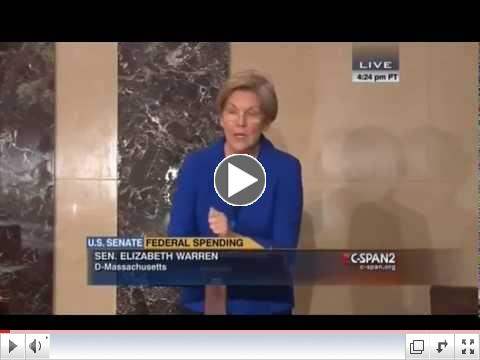 | |
Remarks by Senator Warren
on Citigroup and its bailout provision
|
|
Black Youth-Organized March NYC Draws Tens of Thousands in Movement's Biggest Protest Yet

From Democracy Now! Saturday's nationwide actions against police killings and racial profiling included a "Millions March" that drew tens of thousands to the streets of New York City. It was the largest single protest of the post-Ferguson movement and the culmination of daily actions in New York City since a grand jury elected not to indict the police officer who killed Eric Garner. After gathering in Washington Square Park, a massive crowd spanned dozens of city blocks as it marched uptown before turning around and closing at police headquarters downtown. Democracy Now!'s Aaron Mat� and Samantha Riddell were in the streets to speak to the protesters who came out, and the young black organizers who made it happen.
Transcript
This is a rush transcript. Copy may not be in its final form.
AMY GOODMAN: Saturday's actions across the country included a Millions March that drew tens of thousands to the streets of New York. A massive crowd took over the streets after gathering in Washington Square Park, heading uptown before turning around and closing at police headquarters downtown. A smaller group of thousands then broke off to march across the Brooklyn Bridge. Democracy Now!'s Aaron Mat� and Samantha Riddell were in the streets of New York for the Millions March. They filed this report.
PROTESTERS: Eric Garner, Michael Brown! Shut it down! Shut it down! For Eric Garner, Michael Brown! Shut it down! Shut it down! For Eric Garner, Michael Brown! Shut it down! Shut it down!
AARON MAT�: There have been actions every single day here in New York City since a grand jury elected not to indict Officer Daniel Pantaleo for the killing of Eric Garner. But none are bigger than this Millions March behind me, thousands here in Washington Square Park, marching throughout the city to demand justice in the case of Eric Garner and scores of other unpunished and unprosecuted police killings of unarmed African Americans across the country....(Click title for more)
|
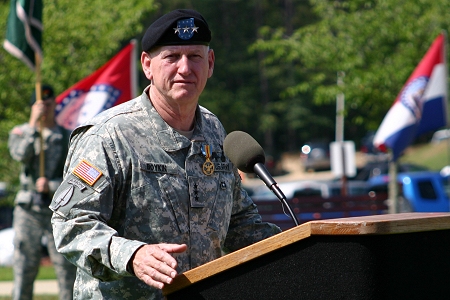
Retired three-star general William "Jerry" Boykin refuses to fade away.
By Don Terry
SPLC Intelligence Report via Alternet
Dec 12, 2014 - SPARKS, Nev. - Retired three-star general William "Jerry" Boykin is the executive vice president of the anti-LGBT, archconservative Family Research Council, the FRC. He isby in charge of its day-to-day operations, but he is no desk jockey.
White-haired and 66, Boykin is an old soldier who refuses to fade away. A popular speaker on the conservative Christian speaking circuit, Boykin is constantly on the road, crisscrossing the country from pulpit to pulpit, recruiting a Christian army to battle the forces of Satan, hell-bent, he says, on destroying America with such weapons as same-sex marriage, radical Islamists, gun control, abortion, and a "Marxist model" for world conquest.
"You wonder why there's so much religious persecution in America today," he asked a Texas church audience two years ago. "It's because we're becoming a Marxist nation."
Over the recent Fourth of July weekend - Boykin's favorite time of the year except for Easter and Christmas - the self-described Warrior for God was on the road far from his Washington, D.C., office. Boykin was in the pulpit of an evangelical church in the scraggly brown hills of Nevada, not far from the neon lights and blackjack tables of Reno, "The Biggest Little City in the World."
Boykin spoke at six separate services - upstairs and downstairs - at the Summit Christian Church on Saturday and Sunday, repeating his themes of peril, prayer and politics.
"Tyranny is returning to America," he said at one session. "Tyranny, as we see our Constitution being shredded. Tyranny, as we see every liberty we have been provided being challenged."
At another service he declared, "Our faith is under fire today like it has never been under fire."
And as he prowled the pulpit like a talk-show host, a huge Bible in one hand, a pocket-sized copy of the United States Constitution in the other, and a wireless microphone strapped to his head, he announced, "I'm neither a Republican nor a Democrat."
"In fact," he said, "the Republicans tried to get me to run for Senate this year. I said, 'I can't run [on the GOP ticket] because I'm an independent. And until you become the conservatives I expect you to be, until you start standing for my values, I'm not going to call myself a Republican.'"
The Republican Party of Cheney, Cruz and Coulter is not conservative enough for Jerry Boykin.
Listening to Boykin speak in Nevada last July, it quickly became obvious that persuading the grandfather of six to give up the ghosts of the Red Scare and the Cold War is a mission impossible. Boykin is not just stubborn. The barrel-chested, ordained minister with a shoulder-fired SA-7 rocket on his basement wall and "probably more guns than anybody in here" claims to have some well-connected back-up in his crusade to restore and save his version of America.
"Me plus the Holy Spirit," he said, "is the majority."
Theocracy and Islamophobia
Boykin's far-right r�sum� since retiring from the military includes a seat on the board of the Christian Dominionist-leaning Oak Initiative, which, according to its website, promotes a grassroots movement to "mobilize and organize a cohesive force of activated Christians." Dominion theology calls for Christians to implement a nation governed by Christians or by a conservative Christian interpretation of biblical law.
The general has made videos on behalf of the Oak Initiative. In one, he looks into the camera and - with a straight face - claims that President Obama is developing his own brown-shirt army to enforce Marxism under the guise of healthcare reform. ...(Click title for more)
|

Excerpts from a report filed by a U.S. Embassy staffer in 2009, based on conversations with a Chinese professor who has known Xi Jinping since their youth.
Reference ID 09BEIJING3128
Created 2009-11-16 12:20
Classification CONFIDENTIAL
Origin Embassy Beijing
A longtime Embassy contact and former close friend of Politburo Standing Committee Member and Vice President Xi Jinping has shared with PolOff [Political Officer] his first-hand knowledge of Xi's family background, upbringing, early adulthood, and political career, as well as his impressions and assessments of Xi's personality and political views. The information was acquired in multiple conversations over a two-year period 2007-2009.
The contact is an American citizen of Chinese descent who teaches political science at a U.S. university (protect), hereafter referred to as "the professor."
PolOff's contact ("the professor") and Xi Jinping were both born in 1953 and grew up in similar circumstances. According to the professor, they lived with other sons and daughters of China's first-generation revolutionaries in the senior leaders' compounds in Beijing and were groomed to become China's ruling elite. The professor did not know Xi personally until they had both reached their late teens
Xi's father, Xi Zhongxun, was a communist guerilla leader in northwest China in the 1930s, when Mao and the CCP leaders reached Yan'an at the end of the Long March. Xi Zhongxun was the youngest Vice Premier among the early generation of CCP leaders. Despite his association with Mao's group, said the professor, Xi Zhongxun was also "good friends" with Deng Xiaoping and was "actually closer to Deng than to Mao."
Both Xi Zhongxun and the professor's father were purged during the Cultural Revolution and spent time in prison, according to the professor. Both Xi Zhongxun and the professor's father were later rehabilitated when Deng Xiaoping returned to power. Xi was rehabilitated by Deng in 1978 and was appointed by Deng as Party Secretary in Guangdong in the 1980s.
The professor said that he and others found dramatically different ways to "survive" the aftermath of the Cultural Revolution. While the professor and his closest circle of friends descended into the pursuit of romantic relationships, drink, movies and Western literature as a release from the hardships of the time, Xi Jinping, by contrast "chose to survive by becoming redder than the red."
According to the professor, Xi was always "exceptionally ambitious" and had his "eye on the prize" from the very beginning. Once Xi had returned from his education in the worker-soldier-peasant revolutionary committee, he carefully laid out a career plan that would maximize his opportunities to rise to the top levels of the Party hierarchy, first becoming a PLA officer in the late 1970s and then serving in a variety of provincial leadership positions, progressively rising through the ranks. By 1979, Xi was on the staffs of the State Council and the Central Military Commission (CMC), serving as an assistant to the CMC Secretary General and later Minister of National Defense (1982), General Geng Biao, a revolutionary comrade of his father's. The professor said he had the impression that Geng Biao had helped Xi Jinping get the PLA job, and that Xi Zhongxun had, in turn, given Geng's daughter a position in Guangdong when he was Party Secretary there.
According to the professor, Xi subsequently became even more serious in plotting a career path to the top. By all appearances, with his father having been politically rehabilitated and rapidly regaining his power, Xi Jinping could have continued to rise quickly in the Central Party apparatus. Xi, however, reasoned that in the long run, staying in Beijing would limit his career potential. Xi told the professor that staying with Geng Biao would eventually shrink his power base, which would ultimately rest primarily on his father's and Geng's networks and political support. Moreover, in time, people would turn against him if he stayed in the Center.
So in a calculated move to lay the basis for a future return as a Central leader, Xi asked for a position in the countryside and, in 1982, became a local official in Shijiazhuang, the capital of Hebei province. Xi later became the Deputy Party Secretary in Zhengding county, also in Hebei. Xi told the professor at the time that he "would be back one day." (Note: Xi later served for many years in Fujian province, becoming Governor in 2000, then moving to Zhejiang province in 2002 to be Party Secretary, and then to Shanghai as Party Secretary in 2007. He was elevated to the Politburo Standing Committee at the 17th National CCP Congress in October 2007 and was appointed Vice President at the National People's Congress in March 2008.)
Xi told the professor at the time that going to the provinces was his "only path to central power." Xi thought it was important to know people in the Central Organization Department and to keep his eyes on the Center, even as he worked his way up the ladder as a local official. According to the professor, Xi "had promotion to the Center in mind from day one." Xi knew how to develop personal networks and work the system, first using his father's networks and later building his own.
Xi has a genuine sense of "entitlement," believing that members of his generation are the "legitimate heirs" to the revolutionary achievements of their parents and therefore "deserve to rule China." For this reason, the professor maintained, Xi could never be a "true member" of current President Hu Jintao's camp, even if Xi did not give any indication of opposition to Hu Jintao now. Xi and other first-generation princelings derisively refer to people with non-Party, non-elite, commercial backgrounds like Hu Jintao as "shopkeepers' sons," whose parents did not fight and die for the revolution and therefore do not deserve positions of power.
Xi knows how very corrupt China is and is repulsed by the all-encompassing commercialization of Chinese society, with its attendant nouveau riche, official corruption, loss of values, dignity, and self-respect, and such "moral evils" as drugs and prostitution, the professor stated. The professor speculated that if Xi were to become the Party General Secretary, he would likely aggressively attempt to address these evils, perhaps at the expense of the new moneyed class.
Xi at one point early in his career was quite taken with Buddhist mysticism, according to the professor. In comments Xi made to the professor, including during the professor's visit to Xiamen while Xi was serving as an official there, Xi displayed a fascination with Buddhist martial arts, qigong, and other mystical powers said to aid health, as well as with Buddhist sacred sites such as Wutaishan. The professor said he does not know whether Xi was actually religious, or whether he was simply looking for a way to aid his health and well-being. Regardless, the professor said, he was extremely surprised by how much Xi knew about the subject and Xi's seeming belief in supernatural forces.
Xi also knows Taiwan and the Taiwan people very well, the professor said, noting that Xi was in Fujian province for more than twenty years. Attracting Taiwan investment to Fujian was an important part of his accomplishments as a Xiamen official.
|
|
Remembering Mario Savio, 'Freedom's Orator' ...The man who helped spark Berkeley's Free Speech Movement fifty years ago would have championed today's activism, from the Dreamers to Occupy to Ferguson.
 This essay is adapted from Tom Hayden's foreword to The Essential Mario Savio: Speeches and Writings That Changed America, edited by Robert Cohen and published this past September by the University of California Press. This essay is adapted from Tom Hayden's foreword to The Essential Mario Savio: Speeches and Writings That Changed America, edited by Robert Cohen and published this past September by the University of California Press.
By Tom Hayden
It is a worthy time to study and treasure the eloquent speeches of Mario Savio-"freedom's orator," as the historian Robert Cohen rightly calls him.
I didn't know Mario well, mainly because of our separate geographic orbits, but our paths were intertwined. As a student editor from the University of Michigan in Ann Arbor, I hitchhiked to Berkeley in the summer of 1960, where I stayed in an apartment belonging to activists from Slate, the campus political party that was demanding a voice for students stifled by university paternalism. Slate activists were among those who had been hosed down on the rotunda steps of San Francisco's City Hall after protesting the House Committee on Un-American Activities that spring. The FBI opened a file on me simply for writing an editorial in The Michigan Daily supporting the student critics. I remember interviewing the aptly named Alex Sherriffs, the aggressive University of California vice chancellor who wanted to shut down the tiny Bancroft strip where I was first leafleted by that friendly student who found me a place to stay. In a memo at the time, Sherriffs called the Slate activists "office seekers and publicity hounds...misfits, malcontents and other politically oriented individuals who do not conform to the normal political activity in the university community." My kind of people.
This was the dawn of the 1960s. A countercommunity was forming, and the simple idea of student rights was infectious. The Slate leaders pushed me to create a similar campus political party in Ann Arbor, which I helped to do that fall; known as Voice, it became the first chapter of the national SDS (Students for a Democratic Society).
Our strategy in SDS was to excite students nationally through the model of students putting their lives on the line down South. It worked. In late 1961, I was a Freedom Rider in Georgia and was beaten and expelled from McComb, Mississippi, while writing a pamphlet about a voting-rights campaign. By spring semester in 1964, Berkeley activists-Mario among them-were copying the Southern sit-ins against Jim Crow lunch counters with their own sit-in against racist hiring at San Francisco's Sheraton Palace Hotel. That experience propelled Mario to volunteer in the 1964 Mississippi Freedom Summer Project in McComb, where he was also subjected to the radicalizing violence I had experienced in 1961.
The links kept being forged. In June 1962, the first SDS convention, in Port Huron, Michigan, adopted a lengthy statement calling for students to forge a participatory democracy based on the direct-action model of SNCC (the black-led Student Nonviolent Coordinating Committee) and the radical notion that students could be "agents of social change" and universities the laboratories of reform. That abstract Port Huron vision was realized when the Free Speech Movement (FSM) burst into history in 1964. Mario himself spoke favorably of participatory democracy, and activists like Jackie Goldberg carried the Port Huron Statement in their backpacks.
I lived in Berkeley later (1968-70), during the post-FSM years, when the rhetoric was more revolutionary. The campus was often choked by tear gas, student strikes were frequent, and armed Black Panthers sold Mao's Little Red Book on the Sproul steps. The early utopian moment was clouded by internal strife, and the community was anything but blessed. During the People's Park march of 1969, I witnessed sheriff's deputies coldly kill one bystander and blind another with buckshot while they sat on a rooftop overlooking Telegraph Avenue. This lethal moment came just four and a half years after the FSM's rise, and one year before the murders at Kent State and Jackson State. The Berkeley free-speech area was looking like a war zone. The idealistic movement that first gave Mario his magical voice-after having grown up with a stuttering shyness-now left him stranded and alone amid its fragmentation and demise....(Click title for more)
|

By Christine N. Ziemba
Paste Magazine
Decr 2, 2014 - The historical thriller The Imitation Game is precisely the type of film studios love to dangle as Oscar bait. It focuses on a relatively unknown, yet significant, World War II code-cracking project and features a socially awkward genius as its protagonist. It doesn't hurt that the aforementioned hero and his compatriots are Brits.
The film's distributor, The Weinstein Company, scored at the 2011 Academy Awards with the similarly themed The King's Speech, so odds are in The Imitation Game's favor that it will stand among this season's contenders-despite the plot's flaws.
Noted mathematician and cryptanalyst Alan Turing is often considered the father of modern computer science, but his most consequential work-conducted as a WWII codebreaker-remained largely unknown until the British government declassified related documents in the 1970s.
The Imitation Game, with Benedict Cumberbatch as the eccentric Turing, focuses on his wartime tenure at the Government Code and Cypher School in Bletchley Park, located about 50 miles northwest of London. In the confines of the nondescript Quonset Hut 8, Turing leads a team of prototype hackers to decipher Germany's Enigma machine codes. Their work is said to have shortened the length of the war by several years.
 | The Imitation Game - Official Trailer
|
Cumberbatch gives an intense performance as the brilliant loner with behavior that registers along the autism spectrum. While he indulges in too much scenery chewing and stammering, Cumberbatch creates a memorable character who is at once fascinating and off-putting. Turing naturally clashes with the group's more charismatic analyst and man-about-town Hugh Alexander (Matthew Goode), which leaves Scottish mathematician John Cairncross (Allen Leech) and Oxford student Peter Hilton (Matthew Beard) caught in the middle. Also unsurprising is Commander Denniston's (Charles Dance) instant dislike of Turing and his methods; the head of Bletchley Park spends most of the film trying to fire the cryptologist or pull his research funding.
The only person squarely on Turing's side is Joan Clarke (Keira Knightley), an astute mathematician recruited for the testosterone-heavy team. Knightley shows off a dynamic range as she plays a dutiful daughter, torn between obligations to her parents and her country. She can't live with or work alongside the men, so Turing arranges for her to reside with the women in the administrative pool and sneaks her bits of Enigma code to work on from home-an arrestable offense. While Clarke strives to please her parents, she also has a spunky independent streak. She thumbs her nose at societal norms and doesn't call off her engagement to Turing, even when he reveals that he's gay.
The complex relationship between Turing and Clarke is among the film's highlights. The two characters agree to marriage because the semblance of normalcy will keep the government and their families out of their personal lives. After all, the career-minded Clarke is considered a spinster as an unwed woman in her mid- to late-twenties, and Turing's homosexuality is a criminal offense in Britain. Their friendship and "courtship" provide some of The Imitation Game's more interesting moments; Cumberbatch and Knightley light up the screen with a dynamic, yet platonic, chemistry. (Joan Clarke's story is ripe for its own film.) ...(Click title for more)
|
|
Keep up with the Moral Mondays with a Red Resolution...
Become a CCDS member today!
 The time is long past for 'Lone Rangers'. Being a socialist by your self is no fun and doesn't help much. Join CCDS today--$36 regular, $48 household and $18 youth. The time is long past for 'Lone Rangers'. Being a socialist by your self is no fun and doesn't help much. Join CCDS today--$36 regular, $48 household and $18 youth.
Better yet, beome a sustainer at $20 per month, and we'll send you a copy of Jack O'Dell's new book, 'Climbing Jacobs Ladder,' drawing on the lessons of the movement in the South in the 1950s and 1960s.
Solidarity, Carl Davidson, CCDS
|
|
|